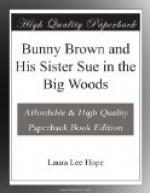So when Eagle Feather called the toy train and the Teddy bear of Bunny Brown and his sister Sue, “heap big medicine,” he meant they would be good not only to cure sickness without medicine, but also keep bad luck away from whoever had them.
“Now we’ll help find your cow, Eagle Feather,” said Bunny, for he was no more afraid of the Indian than you would be of the fireman down in the engine house at the end of your street, or the policeman on your block. Bunny and Sue had lived in the Big Woods so long now, and had seen the Indians so often, even to learning the names of some of them, that they thought no more of them than of some of the farmers round about.
“All right—we go find cow,” said Eagle Feather. “No milk for little papoose if cow no come home.” “Papoose” was the word the Indians used for “baby,” and in the log cabin where Eagle Feather lived were two or three papooses.
“It must have been your cow that poked her head into our tent,” said Sue, “for she had two crumpled horns, and the farmer’s had only one.”
“That right,” said Eagle Feather with a sort of grunt. “My cow have two horns twist like so,” and he held up two fingers and made a sort of corkscrew motion in the air with his hands.
“Then that was your cow all right,” said Bunny. “Uncle Tad tied her to a tree, but maybe we can find her.”
“Sure we find,” grunted Eagle Feather. “Heap big medicine little boy an’ girl have soon find cow.”
What the Indian meant was that he believed the toy train and the electrical Teddy bear would bring such good luck that the lost cow would soon be found.
Mr. Brown had gone back to the city when Bunny and Sue, each one carrying a toy, and followed by Eagle Feather, came back to Camp Rest-a-While. Bunny was in worse condition than his sister, for he had rolled down the steep hill. Sue’s dress was torn a little.
“Why, Bunny! Why, Sue!” cried Mrs. Brown as she saw the two children. “Where in the world have you been?”
“In the woods, playing with our toys,” answered Bunny. “Sue made her Teddy’s eyes flash to scare away the tigers and lions all around us.”
“Oh, you were playing make-believe,” said Mother Brown, for well she knew the different games the children made up.
“But Bunny’s runaway train was real,” said Sue.
“Did your train run away?” asked Mrs. Brown, not paying much attention to the Indian at first, as it was common to see them around the camp, whither they came to beg for scraps of food, the remains of a ham bone, and such things.
“Did your train really run away, Bunny?” asked Mrs. Brown. “Oh, Bunny, you’ve been in the dirt!”
“Yes, and it’s a good thing he didn’t get wet,” went on Sue, for both children always told everything that happened to them as soon as they got back home. Only sometimes it took a little longer than usual to think up all the happenings. “He almost rolled into the lake, Bunny did.”




